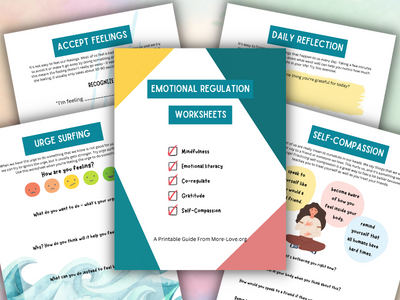
Eating disorders often co-occur with other mental illnesses, including depression, panic disorder and obsessive-compulsive disorder (OCD).
Here is some information about OCD to consider as you observe your child and consider treatment paths. Work with your child’s treatment team to accurately diagnose their full mental health. Professionals will need to treat each co-occurring illness within an overall treatment plan.
- OCD is a type of anxiety disorder.
- Kids who have OCD have either obsessions or compulsions or both.
- Compulsions are things that kids do actively, like lining up objects, or mentally, like counting in their head.
- OCD helps them feel less anxious in the short-term, but do not address anxiety itself.
- OCD often first develops between ages 6-9, but it can occur earlier or later. Symptoms often become more challenging as they go more underground during adolescence.
- A child or adolescent with OCD will be very rigid and rule-bound in many areas of his or her life.
- The most common treatment for OCD is cognitive behavioral therapy (CBT). Often it is treated with a method called exposure and response prevention, or ERP.
- ERP often helps a person learn that they can tolerate feelings of anxiety without resorting to OCD behaviors.
Emotional Regulation Worksheets
Give these printable worksheets to grow more confident, calm and resilient and feel better, fast!
- Self-Esteem
- Self-Regulation
- Mindfulness
- Calming strategies
While in the storm of an eating disorder, it may be hard for you to clearly identify your child’s mental health conditions. The psychology of eating disorders and OCD are both complex and often interrelated. But that’s OK. Diagnoses can shift over time. The important thing is that they are in treatment for at least one condition. Below are some OCD behaviors that you may observe if your child has an eating disorder:
Body dysmorphic disorder (BDD)
BDD is when someone obsesses over minor or imagined flaws in his or her appearance. BDD is on the spectrum of OCD and is also often observed in people who have eating disorders. An example is your child looks in the mirror and sees themself as larger than they actually are. They may observe imaginary pockets of fat, see blemishes that don’t exist, or worry they have excessive body hair.
Food obsessions
Food obsessions occur when someone obsesses over food arrangement, food quantity, food quality, food cleanliness and other food-based obsessions. This can often be seen in someone suffering from anorexia who might obsessively cut, arrange and eat just a few small slices of celery. For people who engage in bingeing, it may involve obsessively planning and executing a binge in a particular, ritualistic manner.
Skin picking
This is often observed in both OCD and eating disorder behaviors. Skin picking is a disorder in which a person picks at their skin obsessively. Some may report a sense of calm or well-being while picking, but others do it completely mindlessly, without remembering that it happened. Skin picking can be correlated with BDD, in which the child perceives imperfections and thus is trying to remedy them, and also with anxiety, as a form of self-soothing.
Please speak with your child’s treatment team to determine whether your child should be (or has already been) evaluated for OCD.

Ginny Jones is the founder of More-Love.org, and a Parent Coach who helps parents who have kids with disordered eating and eating disorders. Combining science, compassion, and experience coaching hundreds of families, she helps parents understand what’s going on with their kids’ eating behaviors and teaches them the science-backed skills to heal kids’ relationship with food, improve their body image, and feel better about themselves, their relationships, and life in general.
Ginny has been researching and writing about eating disorders since 2016. She incorporates the principles of neurobiology and attachment parenting with a non-diet, Health At Every Size® approach to health and recovery.


